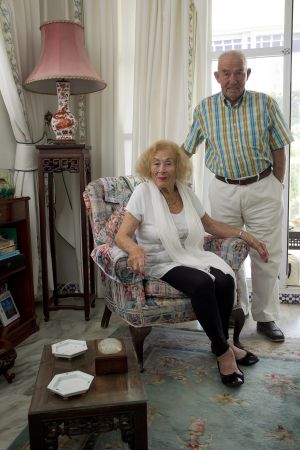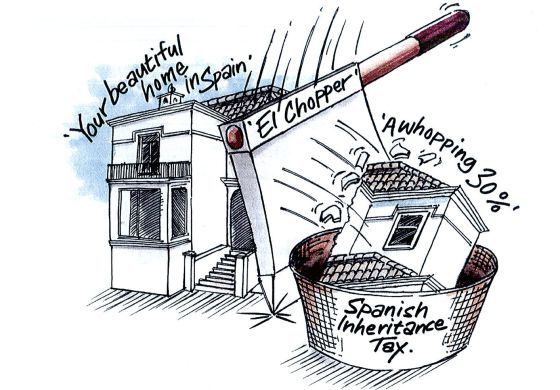El barón David de Rothschild, heredero del famoso linaje industrial y durante años presidente de la banca Rothschild, fue interrogado por escrito por un juez de Dénia (Alicante) que le investiga por publicidad engañosa. Lo hizo el pasado 22 de julio, aunque la comisión rogatoria con la respuesta no llegó al juzgado español hasta el 19 de diciembre. Decenas de jubilados británicos y alemanes acusan a la banca Rothschild de venderles un producto financiero para evadir el impuesto de sucesiones con el que pueden perder sus casas. El barón respondió una y otra vez que no sabía cómo funcionaba el negocio en España. “No conozco ese producto”, responde en un cuestionario repleto de evasivas.

Los jueces españoles siguen elevando el tiro contra la banca. El titular del juzgado de instrucción número 1 de Dénia, Pedro Pablo Abad Ortiz, prosigue con la instrucción de una querella contra la banca Rothschild por publicidad engañosa. Jubilados británicos y alemanes en la costa han ido contra el banco por un producto financiero complejo. Simplificando, Rothschild les daba una hipoteca sobre la casa, ese préstamo era invertido y con los intereses ganaban dinero y además eludían el impuesto de sucesiones si uno de los cónyuges fallecía, porque estaba hipotecado fuera de España.
Así comercializó unas 130 hipotecas que, a una media de 600.000 euros, suman unos 70 millones de euros, según estima Antonio Flores, abogado de los demandantes, para dar un orden de magnitud. Flores tiene sede en Marbella y especializado en defender a extranjeros en la costa. Con la crisis financiera, esas inversiones fueron mal y los jubilados vieron después que debían poner dinero para mantener unas casas que ya tenían pagadas. Unos emprendieron pleitos por vía civil, que ganó Rothschild, y otros siguen en curso, pero este va por la vía penal por publicidad engañosa. “Es importante, puede pasar que vaya a juicio si no da la cara alguien. Él es el máximo director de la empresa. Es la persona que tiene que aprobar que se den esos millones en préstamos”, señala Flores.
“Yo no estuve implicado personalmente en los contratos de Credictselect series 4. Para responder a este cuestionario, me han indicado desde NMR [NMR Rothschilds & Sons] que jamás ha propuesto fondos de inversión ligados a los contratos de esos préstamos”, señala el barón en su respuesta a un cuestionario por escrito. La comisión rogatoria a Francia fue enviada en marzo de 2016. En sus respuestas, que ocupan 17 páginas, abundan las evasivas: “La pregunta no está clara”, “a fin de contestar a este cuestionario, NMR me ha indicado que…”.
“Yo no estuve implicado personalmente en los contratos”, respondió el barón por cuestionario
Según las respuestas de David de Rothschild, los préstamos se daban a “individuos que tenían un inmueble que no estaba sometido a ninguna hipoteca, que declaraban tener otros activos y que eran expatriados [británicos o de otras nacionalidades]”, pero esa hipoteca nunca se dio para reducir el impuesto de sucesiones. Según él, era solo “un préstamo garantizado por el inmueble”, y quien lo pedía seleccionaba “las inversiones de acuerdo con el consejo de su asesor”. A la pregunta de si conoce a Stephen Dewsnip, señalado como uno de los artífices del esquema en España, responde: “Yo no lo conozco personalmente, pero me han informado desde NMR para contestar a este cuestionario que fue administrador de RBI [Rothschild Bank International Limited]”.
Este firmó como presidente de Rotschild Channel Islands un artículo en el que presentaba este sistema como un atajo contra el impuesto de sucesiones. Fue repartido en reuniones en la costa española, según los denunciantes. “Yo no he autorizado la publicidad de este producto porque no he estado jamás implicado personalmente en los contratos de préstamo”, responde el barón al juez de Dénia. Más adelante, responde que NMR no publicitaba la reducción del impuesto de sucesiones.
El barón, a la televisión francesa: “Me sorprendería mucho que se hubiera hecho algo ilegal”
Los demandantes, en cambio, han alegado que siempre se usaba la marca Rothschild y han aportado folletos en los que con el logo del banco se les vendía como una forma de eludir el impuesto de sucesiones. Sin embargo, ladirección general de Tributos contestó a una consulta que no era legal eludir el impuesto de sucesiones hipotecando un bien en el extranjero. Esa hipoteca en el extranjero “no es deducible a efectos del impuesto de sucesiones” y hacerlo “supone una infracción tributaria sancionable”.

“Nadie en el seno de NMR ha estado implicado de ninguna manera en la gestión de esos fondos de inversión”, señala el barón. Su defensa es afirmar que ellos solo daban la hipoteca y que la inversión del dinero —lo que falló y amenaza con llevarse las viviendas— era algo independiente. Hasta ahora, los tribunales españoles han dando la razón en vía civil a Rothschild o los casos siguen en tramitación, pero el caso de Dénia va por vía penal por publicidad engañosa.
El asunto ha llegado a la televisión francesa. El pasado mes de diciembre, la cadena France 2 emitió el reportaje ‘Rothschild, el poder de un nombre‘. Acudieron a la Costa del Sol a entrevistar a afectados por esta hipoteca. En el vídeo (minuto 55), la periodista le enseña al barón la publicidad con el logotipo de Rothschild en que se anunciaban los préstamos. Aparentemente molesto, David de Rothschild replica: “Eso no se podría hacer sin la participación de cierta gente en España que consideraba que era buena idea […] Me sorprendería mucho que se hubiera hecho algo ilegal”.


 A cartoon from an ad related to Spanish inheritance tax.
A cartoon from an ad related to Spanish inheritance tax.